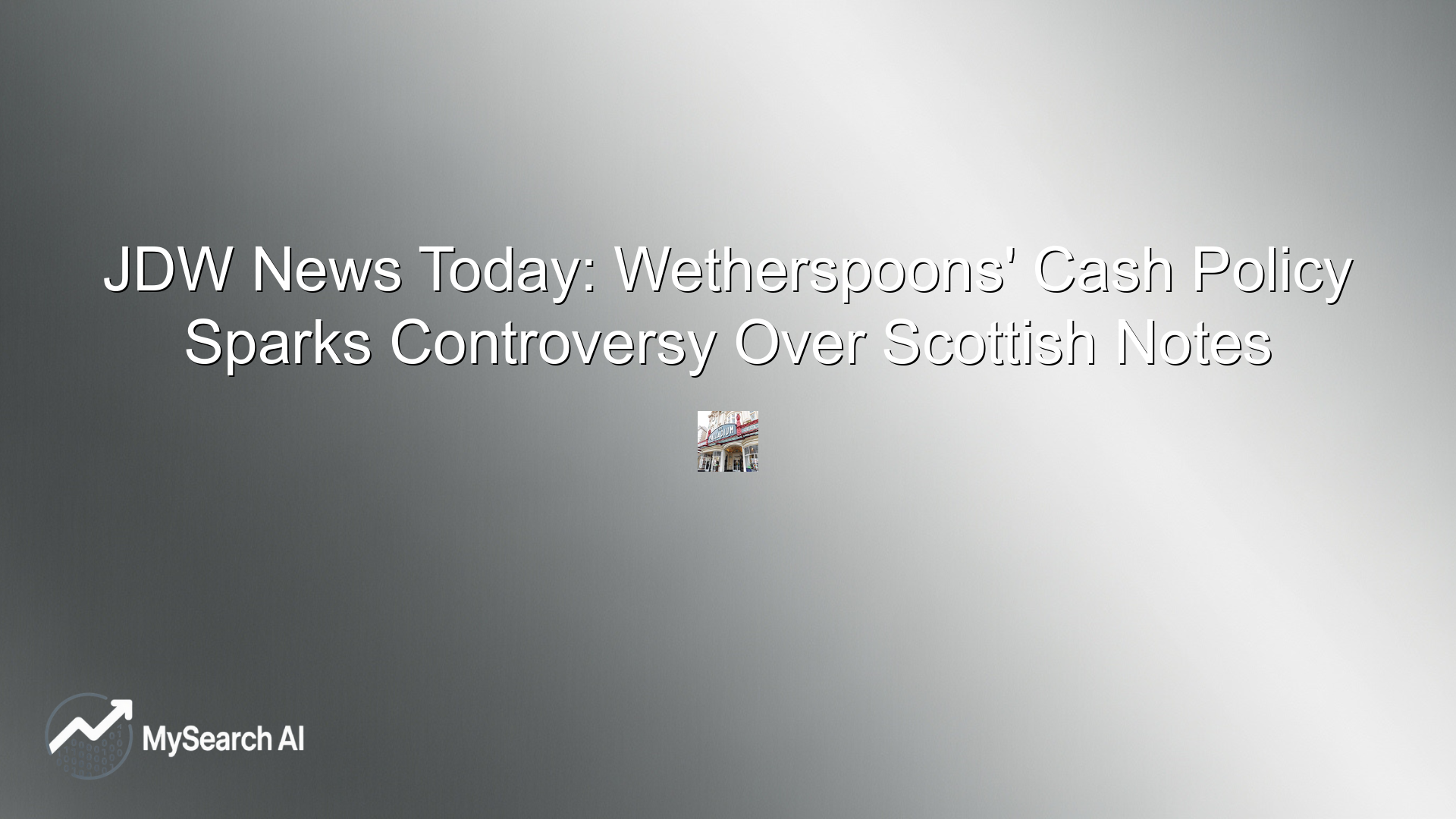Related Articles
Ask anything about stocks
JDW News Today: Wetherspoons’ Cash Policy Sparks Controversy Over Scottish Notes
JD Wetherspoon, a well-known British pub chain, recently ignited controversy by ceasing to accept Scottish £20 and £50 banknotes in its English locations. This decision, made to combat counterfeit currency problems, has led to public backlash. The uproar highlights complex issues around currency acceptance and consumer rights. Understanding these dynamics can help investors and customers alike gauge the rising tension within this sector.
The Controversial Cash Policy
JD Wetherspoon’s recent policy to stop accepting Scottish £20 and £50 banknotes at its English pubs has stirred significant controversy. The company justifies this move by citing an increase in counterfeit issues. By doing so, they aim to protect their revenue and minimize losses due to fake currency circulation.
However, the decision has sparked anger among patrons, particularly those from Scotland who frequently travel to England. Some see this as an unfair treatment of legitimate Scottish tender, which is legal currency in the United Kingdom. This situation sheds light on broader discussions about currency acceptance policies across the UK and raises questions about customer service.
For more on this issue, check this discussion on X: https://www.ibtimes.co.uk/wetherspoons-cash-policy-uproar-truth-behind-why-scottish-money-suddenly-not-welcome-english-1748844
Public Reaction and Backlash
The public has reacted strongly against JD Wetherspoon’s policy. On social media, particularly Twitter and Reddit, many users have expressed frustration and boycotting threats. This backlash could potentially affect public perception and customer loyalty, factors crucial for the hospitality industry’s success.
Moreover, consumer rights advocates argue that this policy may deter Scottish customers, reflecting negatively on Wetherspoon’s brand reputation. Businesses must balance security concerns with customer experience to maintain a positive brand image.
You can see discussions here: https://www.ibtimes.co.uk/wetherspoons-cash-policy-uproar-truth-behind-why-scottish-money-suddenly-not-welcome-english-1748844′ rel=’nofollow’>details on the policy.
Impact on JD Wetherspoon’s Market Performance
Amid this controversy, JD Wetherspoon has seen varied market reactions. As of October 2025, the JDW.L stock is priced at £631.5, with a modest uptick of 0.88%. Despite the negative sentiments, the company has kept a stable financial footing.
The firm’s metrics show a P/E ratio of 10.99 and a consistent revenue per share, indicating resilience. Yet, the policy could influence customer numbers, impacting future revenue. Analysts suggest monitoring how this decision unfolds and its long-term effects on the stock price.
For investors, these controversies underline the importance of understanding both operational decisions and consumer responses.
Final Thoughts
JD Wetherspoon’s decision to stop accepting certain Scottish banknotes has ignited a notable public debate. While aiming to combat counterfeit currency, this move has stirred significant backlash, particularly from Scottish patrons. The reaction underscores the delicate balance businesses must maintain between operational security and customer satisfaction.
In the context of its market presence, Wetherspoon shows resilience with stable stock performance but faces potential risks in customer relations and brand reputation. Investors should keep a close eye on how this controversy might influence future consumer behavior and the company’s market positioning.
For JD Wetherspoon, the controversy offers a lesson in navigating complex legal and consumer landscapes, emphasizing the importance of strategic decision-making that aligns security with customer experience.
FAQs
Why did JD Wetherspoon stop accepting Scottish banknotes?
JD Wetherspoon discontinued the acceptance of Scottish £20 and £50 banknotes in its English pubs due to an increase in counterfeit currency circulation. This policy aims to protect the company’s financial interests by reducing losses from fake notes.
How has the public reacted to the policy change?
The public has reacted negatively, particularly on social media. Many Scottish customers feel unfairly treated, leading to calls for boycotts. This backlash may impact Wetherspoon’s customer loyalty and brand perception.
Is the rejection of Scottish banknotes legal?
Yes, it is legal for businesses in England to refuse Scottish banknotes. While Scottish notes are legal currency, English establishments are not obliged to accept them, similar to a business's right to choose any preferred payment method.
How might this affect JD Wetherspoon’s market performance?
Despite the controversy, JDW.L stocks have shown stability. However, if the backlash leads to decreased sales from Scottish patrons, it could impact future revenue. Investors should watch for any shifts in customer behavior and subsequent financial repercussions.
What are the possible long-term implications of this policy?
Long-term implications include potential changes in consumer perception and loyalty. If the backlash continues, it could lead to a reevaluation of currency policies across the UK, impacting JD Wetherspoon and similar businesses.
Disclaimer:
This is for information only, not financial advice. Always do your research.



